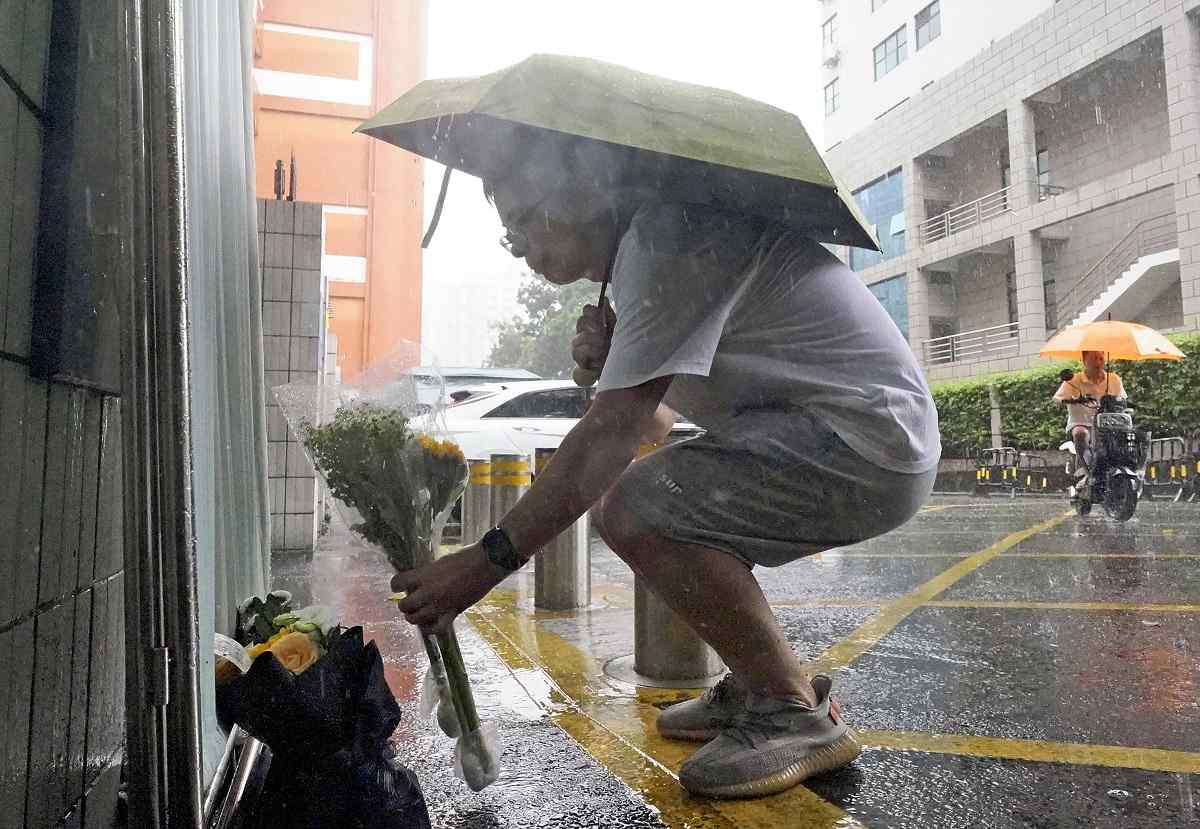Fatal Stabbing Raises Criticism Against Anti-Japanese Education; Chinese History Books, SNS Stirring Resentment


Left: Chinese women hug each other and cry at the Japanese school where they offered flowers Saturday in Shenzhen, Guangdong Province, China.
Right: A Chinese man offers flowers at the main entrance of the Japanese school in the heavy rain.
15:31 JST, September 22, 2024
SHENZHEN — The motivation behind the stabbing and killing of a 10-year-old boy attending a local Japanese school by a 44-year-old Chinese man in Shenzhen, Guangdong Province, remains unclear. The incident has prompted criticism among Chinese people against their own country.
On Saturday, Chinese people visited the Japanese school to offer flowers in the rain, and some criticized the country’s anti-Japanese education. A 40-year-old insurance company employee living nearby said she is skeptical about the content her 12-year-old and 9-year-old sons learn at school.
When Japan began discharging treated water from the Fukushima No.1 nuclear power plant last summer, her children only heard critical remarks against Japan from their teachers, according to the woman. “The content of many history textbooks stirs up resentment against foreign countries,” she said.
A 60-year-old housewife in the city tearfully said, “We should stop history education that triggers such vengeful thoughts.”
In China’s history education, anti-Japanese sentiment can be stirred among students when learning about the Japan-China war and other events. The new patriotic education law was enacted in January to increase patriotism and teach more about President Xi Jinping’s thoughts through history textbooks from this autumn.
Authorities vigilant
In June, three people, including a Japanese woman and her child, were attacked by a Chinese man. The Chinese government deemed it to be an isolated incident, and the same explanation was given for the latest murder in Shenzhen. There are few media reports on the latest case.
A 59-year-old part-time worker pointed out that the problem is that many Chinese people do not question the government’s tendency to hide facts. “This incident was caused by brainwashing in education,” he said.
Some Chinese people reflected further on the situation, also blaming the endless stream of social media posts saying things like: “Japan is pulling the strings behind the scenes” and “Chinese people are killed in Japan.” Chinese authorities are vigilant against an increasing anti-Japanese sentiment. An Internet media outlet reported Saturday that the video-sharing app KuaiShou suspended about 90 accounts that had gathered harmful information to stir up antagonism between Japan and China.
Top Articles in World
-

Israeli Ambassador to Japan Speaks about Japan’s Role in the Reconstruction of Gaza
-

Videos Plagiarized, Reposted with False Subtitles Claiming ‘Ryukyu Belongs to China’; Anti-China False Information Also Posted in Japan
-

Chinese Embassy in Japan Reiterates Call for Chinese People to Refrain from Traveling to Japan; Call Comes in Wake of ¥400 Mil. Robbery
-

Russia: Visa Required for Visiting Graves in Northern Territories, Lifting of Sanctions Also Necessary
-

China, India Tapping into Promising African Market; Beijing Announces Tariff Cuts, Both Countries Aim to Expand Exports
JN ACCESS RANKING
-

Producer Behind Pop Group XG Arrested for Cocaine Possession
-

Japan PM Takaichi’s Cabinet Resigns en Masse
-

Japan Institute to Use Domestic Commercial Optical Lattice Clock to Set Japan Standard Time
-

Man Infected with Measles Reportedly Dined at Restaurant in Tokyo Station
-

Israeli Ambassador to Japan Speaks about Japan’s Role in the Reconstruction of Gaza























